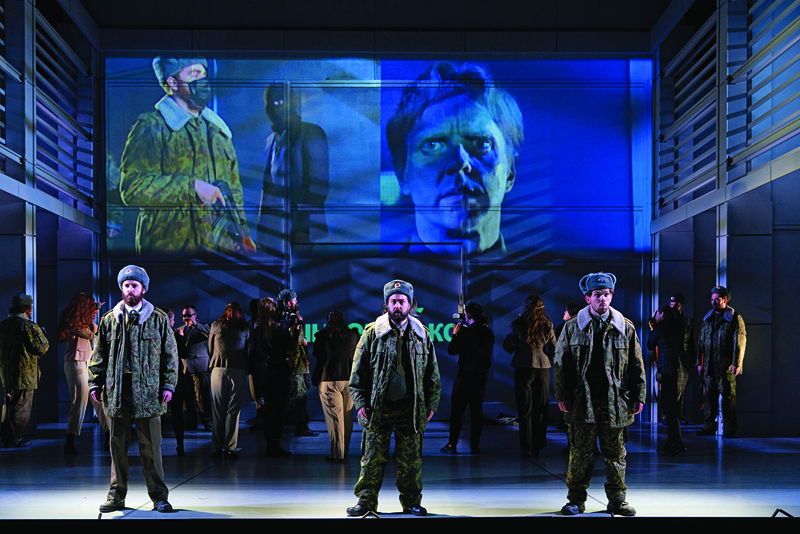 An undated handout picture shows a dress rehearsal of the opera The Life & Death of Alexandre Litvinenko at Grange Park Opera in West Horsley. - AFP
An undated handout picture shows a dress rehearsal of the opera The Life & Death of Alexandre Litvinenko at Grange Park Opera in West Horsley. - AFPA chorus in medical scrubs intones "polonium, polonium" as an opera about the poisoned Kremlin critic Alexander Litvinenko premieres in a British theatre yesterday. The former Russian security agent died in 2006 after drinking tea laced with the radioactive isotope Polonium-210 at a London hotel. As he lay dying in hospital, he pointed the finger at Russian President Vladimir Putin. Delayed for a year by virus restrictions, British composer Anthony Bolton's opera "The Life & Death of Alexander Litvinenko", will be staged at Grange Park Opera in Surrey, southwest of London. Tickets have sold out for the opening night, the company's website said.
The 71-year-old composer has said he was inspired by a biography of Litvinenko written by the former FSB office's widow Marina and friend Alex Goldfarb. At a dress rehearsal, Bolton told AFP he was shocked by the details of Litvinenko's suffering. "He lived 25 days or so, deteriorating with his body being eaten from the inside out. So I was very moved by that," he said. "It was then this inspiration (came), that it had the ingredients for an opera."
In the play, Litvinenko is seen lying in a hospital bed with his hair having fallen out because of the radiation poisoning. Marina Litvinenko, 59, told AFP the opera was "fully based" on the biography she co-wrote. "It's very emotional because I see not only my story, I can listen to music. And this altogether makes a very strong feeling," she said.
'Putin-approved' killing
"It looks like justice for me," she added, since the opera names "the people who committed this crime, who killed my husband. These people are killers." The opera includes a character representing Putin, although he is named only as "the head of the KGB". A British public inquiry in 2016 concluded that Putin had "probably approved" Litvinenko's killing, which it said was likely to have been FSB-directed. Two Russians, Andrei Lugovoi and Dmitry Kovtun, were identified by British police as prime suspects after they both met Litvinenko at a central London hotel . But attempts to extradite them have failed.
Now a nationalist MP, Lugovoi said that "the fact that a political show, behind which stand the British secret services, has finally been turned into a theatrical, operatic show, says a lot". He added he was "unlikely" to watch the opera in full. "I definitely won't lose any sleep over a British director seeing me as an operatic villain," he told AFP in Moscow. The Litvinenko poisoning frayed diplomatic ties between London and Moscow. They were further eroded by the attempted murder in 2018 of ex-Russian double agent Sergei Skripal and his daughter in Salisbury, southwest England, using a weapons-grade nerve agent Novichok.
Litvinenko, a former FSB lieutenant-colonel, fled to the UK in 2000 as he faced criminal charges in Russia after blowing the whistle on an alleged FSB plot to assassinate Boris Berezovsky, a tycoon and Kremlin insider. Berezovsky also moved to the UK and died in unclear circumstances in 2013. Litvinenko also claimed the FSB were involved in deadly bombings of Russian apartment blocks in 1999 -- after which Putin launched a second Chechen war-and in a Moscow theatre siege by Chechen rebels in 2002. His wife told the UK's public inquiry Litvinenko was working for Britain's MI6 foreign intelligence service at the time of his death.
'Howl of protest"
Litvinenko fell ill on November 1, 2006, and died on November 23. In a letter released after his death, he told Putin: "You succeeded in silencing one man but the howl of protest from around the world will reverberate, Mr Putin, in your ears for the rest of your life." Litvinenko's story has already inspired a play called "A Very Expensive Poison" by Lucy Prebble, based on a book by The Guardian's former Moscow correspondent Luke Harding.
Bolton said he hoped that with his opera, "I've given some longevity to the story of his life". He included Russian musical references: Rachmaninov, Shostakovich and Tchaikovsky, as well as a Red Army marching song, the Chechen anthem and a Moscow football chant. The staging at a 700-seater opera house includes a scene where gun-wielding Chechen rebels walk through the audience, recreating the 2002 siege of Moscow's Dubrovka theatre. The libretto was written by Kit Hesketh-Harvey, who has adapted classic operas such as "La Traviata" as well as working on a popular BBC sitcom, "The Vicar of Dibley". - AFP









